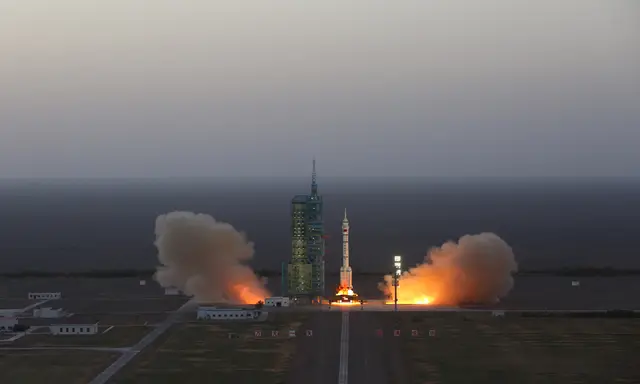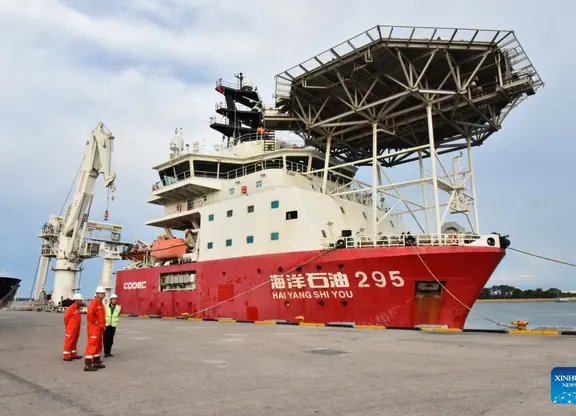The spacecraft, with two male astronauts on board, was launched at the Jiuquan Satellite Launch Center in northwest China's Gobi desert at 7:30 a.m. Beijing Time Monday atop a Long March-2F Y11 carrier rocket.
The spacecraft later entered the designated orbit.
The mission was declared a success by Zhang Youxia, commander-in-chief of China's manned space program, about 19 minutes after the blast-off.
President Xi Jinping, also general secretary of the Communist Party of China (CPC) Central Committee, sent a message of congratulations on the successful launch. Fan Changlong, vice chairman of the Central Military Commission (CMC), read Xi's message.
The mission of the orbiting space lab Tiangong-2 and the Shenzhou-11 manned spacecraft marks the first time that Chinese astronauts will stay in orbit for medium term, Xi, also CMC chairman, said in the message.
Xi urged staff of the mission to carry on their work to guarantee that designated targets will be realized. He also encouraged them to "constantly break new ground for the manned space program, so that Chinese people will take bigger steps and march further in space probe, to make new contribution to the building of China into a space power.”
Xi sent the message from the western Indian state of Goa where he attended the eighth summit of the emerging-market bloc of BRICS, which groups Brazil, Russia, India, China and South Africa.
Premier Li Keqiang and Liu Yunshan, both members of the Standing Committee of the Political Bureau of the CPC Central Committee, watched the live broadcast of the launch at the command center of China's manned space program in Beijing。
Shenzhou-11 will dock with Tiangong-2, and then the astronauts will enter the space lab. The two astronauts are commander Jing Haipeng, a 50-year-old veteran who carried out Shenzhou-7 and Shenzhou-9 missions before, as well as Chen Dong, 38, who is on his first space mission.
Tiangong-2 has been sent into space on Sept. 15. The rendezvous will occur at the orbit about 393 kilometers above Earth.
A see-off ceremony for the two astronauts was held at the Jiuquan Satellite Launch Center ahead of the launch on Monday morning.
The Long March-2F carrier rocket carrying China's Shenzhou-11 manned spacecraft blasts off from the launch pad at the Jiuquan Satellite Launch Center in Jiuquan, northwest China's Gansu Province, Oct. 17, 2016. Photo: Xinhua/Li Gang
Monday's successful launch of the Shenzhou-11 spacecraft is another step forward to put China among leading players in space technology, said Alexander Zheleznyakov, a Russian expert on history of space flights.
The craft with two astronauts aboard is planned to dock with China's second experimental space lab Tiangong-2 launched in mid-September.
The move marked China's latest effort in a couple of months toward a space power, after successes in the maiden flight of its new generation carrier rocket Long March-7 in June, and the launch of the world's first quantum satellite "Micius" in August, among other developments.
China's achievements and programs in space missions, in particular the lunar exploration program that is well planned and steadily advanced with achievable goals, are impressive and admirable, said Zheleznyakov, who is also member of the Tsiolkovsky Russian Academy of Cosmonautics.
He thought that qualities of the Tiangong-2 space lab indicate the way how China would build its planned space station, which is similar to that of the International Space Station, by gradually docking other space modules with the basic cabin.
Zheleznyakov believed that China's experimental space lab will help provide solutions for spacecraft of different functions to approach and dock, and for a long-term operation of life support system, among others, in order to increase both the safety of astronauts and the service life span of the space station.
He expected to see a node module at China's future space station with multiple docking ports, compared to the only one currently at the Tiangong-2.
The Russian expert added that manned space missions can help push the development of other industries, especially high-tech ones, as space projects involve new materials, advanced application programs and innovative technical solutions, including cutting-edge results in many areas.
Igor Lisov, a prominent Russian space expert and an editor at the industry magazine Cosmonautics News, also spoke highly of China's steady progress in its manned spaceflight programs.
With the achievements made, China can now test technologies for cargo spacecraft docking, life support system operation and water recycling, among others, so as to ensure a long-term continuous operation of its space station in future with less dependance on replenishment from the Earth, he said.
Sergey Zhukov, a test cosmonaut and president of the Moscow Space Club,said it will be the right choice for China to build a space station on the basis of the cylinder structure of the Tiangong-2 space lab.
On the prospects of China's space station, Zhukov believed that advances in technology would likely turn future space station into a terminal to enable manned space missions further beyond as well as stopovers of spacecraft such as mooncraft for maintenance and cargo relays.
Broader space cooperation between Russia and China will benefit each other, he added.
(APD)
 简体中文
简体中文






